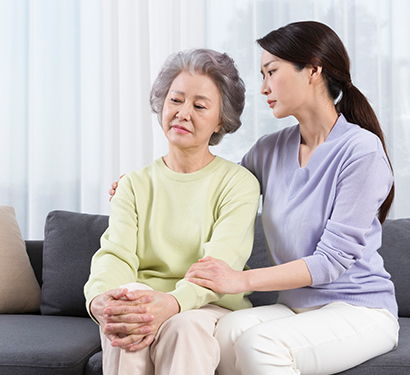Debunking Myths About Cancer: Top 10 Common Misconceptions That Can Save Lives
07 March 2022
Common misconceptions surrounding cancer demystified which could save a life
“Rice cookers can cause cancer”, “The COVID-19 vaccine will increase your chances of getting cancer” ... As a cancer patient or knowing someone who does have cancer, you might have been tempted to forward a WhatsApp message from well-meaning family members and friends about some new cancer-causing discovery but oftentimes, these unverified news sources can be more confusing than helpful, and detrimental to the well-being of the patient.
Always speak to a medical professional before making new life changing decisions, and in the meantime, here are some of the most common myths surrounding cancer, debunked.

Myth 1: Don’t have children; you’ll pass the cancer gene to them
Cancer affects women differently, especially for those who have or want to have children down the line. Fortunately, only 5 to 10 percent of cancers are genetically related and most cancers are sporadic. Therefore, it is best to talk to a genetic counsellor before making such a big life decision.
“It’s important for an individual to assess their risk. I would advise someone who is at high risk—for example, if their mother or sister has breast or ovarian cancer, to see a genetic counsellor first,” says Dr Jennifer Leong, clinical oncologist at Sunway Medical Centre. “Not all cancers are going to be passed on to the next generation.”
Myth 2: Eating herbs and traditional medicine is able to cure cancer
“It isn’t all wrong; traditional medicine, within reason, can be used to complement western medicine,” says Dr Jennifer. “Clinical trials are done and well validated to confirm the efficacy of the treatment.” Her advice would be for patients to always have an open discussion with their oncologist, rather than hide it so the doctor is aware and can advise accordingly.
Myth 3: Eating sugar causes cancer to grow
Sugar is found in a lot of places but it is important to note that there are both good and bad sugars. Avoid artificial sugars and sweeteners found in drinks and desserts, but sugar found in foods like rice and bread can actually help in cellular growth. “Take those in moderation and avoid those 3-in-1 packet drinks,” advises Dr Jennifer.
Myth 4: Chemotherapy always has bad side effects; radiation therapy will kill you
A common misconception is that cancer patients will die from chemotherapy, rather than the cancer. This is simply not true, as given the right selected group of patients, chemotherapy and radiation therapy can save their lives. Patients need to be empowered to understand the potential side effects, and give them enough supportive treatment to go alongside their main treatment.
“We live in an exciting era where we have precision medicine; this means that not all cancer treatment equals chemotherapy,” Dr Jennifer elaborates. “There’s targeted therapy based on the type of cancer and stage, so doctors can offer the right treatments with less side effects as opposed to chemotherapy.”
Myth 5: Smartphones and technology are the cause of cancers
While it might be tempting to use this as a reason to stay off the grid and avoid receiving confusing messages in the first place, truthfully, smartphones do not cause cancer. “We don’t have enough data or trials to say that it actually causes cancer directly,” says Dr Jennifer.
Myth 6: All lumps are cancerous
Finding a lump on your body often strikes fear in women, but do not fret … not all lumps are cancerous. “Get checked, do a mammogram or ultrasound, and if needed, then a biopsy,” says Dr Jennifer. “Another myth is that biopsy causes cancer but in reality, a biopsy is important for us to pinpoint the diagnosis of cancer because there are different types of cancers that will affect the treatment prescribed, so it does not make cancer spread.”
Myth 7:The mRNA COVID-19 vaccines change your DNA and could cause cancer
COVID-19 vaccines seem to be the hottest topic among social media and chat groups, but ultimately, we know that the vaccine saves lives according to science and research. “Cancer patients are more immuno-suppressive; if they do get COVID-19, it is shown that they have a higher risk of ICU admission and death,” explains Dr Jennifer. “The benefits far outweigh the risks.”
Myth 8: Once you get treatment, you will go bald and your hair will never grow back
The fear of not having hair can truly be debilitating for women and sometimes the cause for rejection of treatment for vanity's sake, but this is not true. Hair will grow back, once the treatment stops, especially in chemotherapy. “In fact, a lot of times hair grows back thicker and softer,” says Dr Jennifer.
Myth 9: Cancer will always come back
“This is not true, cancers that are treated or detected early, have very good survival outcomes,” says Dr Jennifer. “I have patients who have led long, fulfilling lives without any relapse.”
Myth 10: Cancer is always fatal
When cancer is diagnosed at an early stage, a patient can live for a very long time and the survival rate is excellent. “Cancer does not equate to a death sentence, and it can absolutely be beaten,” explains Dr Jennifer.
She adds that if you have symptoms or feel unwell which can be as non-specific as diarrhoea or bloatedness that does not seem to go away, to just seek an opinion—even a second or third, and get diagnosed early; anyone can beat cancer if diagnosed early. “It goes without saying, early detection saves lives.”






